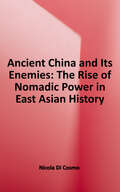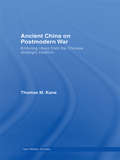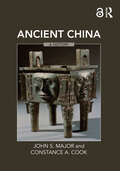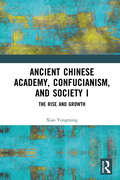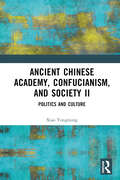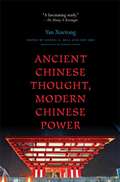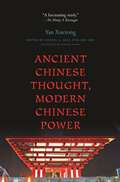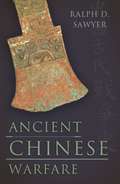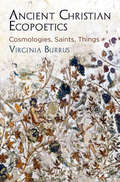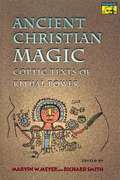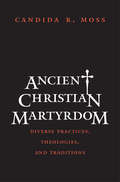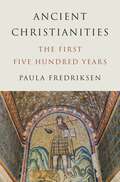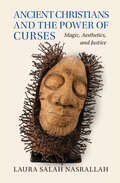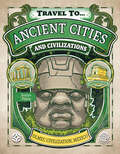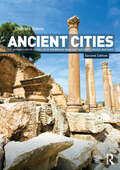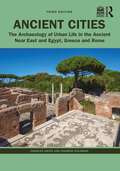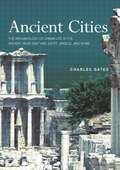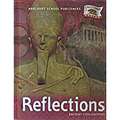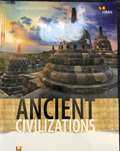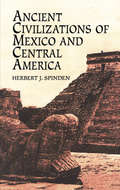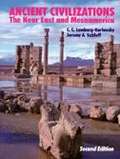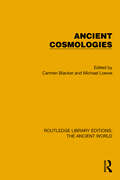- Table View
- List View
Ancient China and Its Enemies: The Rise of Nomadic Power in East Asian History
by Nicola Di CosmoRelations between Inner Asian nomads and Chinese are a continuous theme throughout Chinese history. By investigating the formation of nomadic cultures, by analyzing the evolution of patterns of interaction along China's frontiers, and by exploring how this interaction was recorded in historiography, this looks at the origins of the cultural and political tensions between these two civilizations through the first millennium BC. The main purpose of the book is to analyze ethnic, cultural, and political frontiers between nomads and Chinese in the historical contexts that led to their formation, and to look at cultural perceptions of 'others' as a function of the same historical process. Based on both archaeological and textual sources, this book also introduces a new methodological approach to Chinese frontier history, which combines extensive factual data with a careful scrutiny of the motives, methods, and general conception of history that informed the Chinese historian Ssu-ma Ch'ien.
Ancient China and the Yue
by Erica Fox BrindleyIn this innovative study, Erica Brindley examines how, during the period 400 BCE–50 CE, Chinese states and an embryonic Chinese empire interacted with peoples referred to as the Yue/Viet along its southern frontier. Brindley provides an overview of current theories in archaeology and linguistics concerning the peoples of the ancient southern frontier of China, the closest relations on the mainland to certain later Southeast Asian and Polynesian peoples. Through analysis of warring states and early Han textual sources, she shows how representations of Chinese and Yue identity invariably fed upon, and often grew out of, a two-way process of centering the self while de-centering the other. Examining rebellions, pivotal ruling figures from various Yue states, and key moments of Yue agency, Brindley demonstrates the complexities involved in identity formation and cultural hybridization in the ancient world and highlights the ancestry of cultures now associated with southern China and Vietnam.
Ancient China on Postmodern War: Enduring Ideas from the Chinese Strategic Tradition (Cass Military Studies)
by Thomas M. KaneSun Tzu and other classical Chinese strategic thinkers wrote in an era of social, economic and military revolution, and hoped to identify enduring principles of war and statecraft. The twenty-first century is a time of similarly revolutionary change, and this makes their ideas of particular relevance for today’s strategic environment. Placing these theories in historical context, Dr Kane explores ancient Chinese reactions to such issues as advances in military technology and insurgency and terrorism, providing interesting comparisons between modern and ancient. The book explains the way prominent Chinese thinkers - such as Sun Tzu, Han Fei Tzu and Lao Tzu - treated critical strategic questions. It also compares their ideas to those of thinkers from other times and civilizations (e.g. Clausewitz) to illuminate particularly important points. In concluding, the book addresses the question of how ancient Chinese ideas might inform contemporary strategic debates. Ancient China on Postmodern War will be of much interest to students of strategic studies, Chinese philosophy and military history.
Ancient China: A History
by John S. Major Constance A. CookAncient China: A History surveys the East Asian Heartland Region – the geographical area that eventually became known as China – from the Neolithic period through the Bronze Age, to the early imperial era of Qin and Han, up to the threshold of the medieval period in the third century CE. For most of that long span of time there was no such place as "China"; the vast and varied territory of the Heartland Region was home to many diverse cultures that only slowly coalesced, culturally, linguistically, and politically, to form the first recognizably Chinese empires. The field of Early China Studies is being revolutionized in our time by a wealth of archaeologically recovered texts and artefacts. Major and Cook draw on this exciting new evidence and a rich harvest of contemporary scholarship to present a leading-edge account of ancient China and its antecedents. With handy pedagogical features such as maps and illustrations, as well as an extensive list of recommendations for further reading, Ancient China: A History is an important resource for undergraduate and postgraduate courses on Chinese History, and those studuing Chinese Culture and Society more generally.
Ancient Chinese Academy, Confucianism, and Society I: The Rise and Growth
by Xiao YongmingAs the first volume of a two-volume set that studies the ancient Chinese academy from a socio-cultural perspective, this title explores the history of the academy and its relationship with the development of Confucianism in the Song, Yuan, and Ming dynasties. Inaugurated in the Tang dynasty and eventually abolished in the late Qing dynasty, the academy, as a unique cultural and educational organization in Chinese history, exerted extensive and profound influences on ancient Chinese culture, politics, and social life. The book first revisits the inception and development of the academy by anaylzing the socio-cultural context and different driving forces including social mentality, print culture, education systems, and so on. It then examines the reciprocity and thriving relationships between the academy and Neo-Confucianism in the Song and Yuan dynasties and Yangming School of Mind in the Ming dynasty. The title will be a useful reference for scholars, students, and general readers interested in cultural history, intellectual history, and educational history of ancient China and especially the Chinese academy culture.
Ancient Chinese Academy, Confucianism, and Society II: Politics and Culture
by Xiao YongmingAs the second volume of a two-volume set that studies the ancient Chinese academy from a socio-cultural perspective, this title investigates the multifaceted roles and political and cultural significance of the academy. Inaugurated in the Tang dynasty and eventually abolished in the late Qing dynasty, the academy, as a unique cultural and educational organization in the Chinese history, exerted extensive and profound influence on the ancient Chinese culture, politics, and social life. This title first discusses the state control of the academy and how it functions in social governance, then examines the sacrificial ritual of the academy and its influence on education, enculturation, Confucian orthodoxy, and intellectual ethos, and finally elaborates on the academy's role in enriching the regional cultures in terms of local cultural undertakings and talent cultivation. The title will be a useful reference for scholars, students, and general readers interested in cultural history, intellectual history, and educational history of ancient China and especially the Chinese academy culture.
Ancient Chinese Thought, Modern Chinese Power
by Yan XuetongThe rise of China could be the most important political development of the twenty-first century. What will China look like in the future? What should it look like? And what will China's rise mean for the rest of world? This book, written by China's most influential foreign policy thinker, sets out a vision for the coming decades from China's point of view. In the West, Yan Xuetong is often regarded as a hawkish policy advisor and enemy of liberal internationalists. But a very different picture emerges from this book, as Yan examines the lessons of ancient Chinese political thought for the future of China and the development of a "Beijing consensus" in international relations. Yan, it becomes clear, is neither a communist who believes that economic might is the key to national power, nor a neoconservative who believes that China should rely on military might to get its way. Rather, Yan argues, political leadership is the key to national power, and morality is an essential part of political leadership. Economic and military might are important components of national power, but they are secondary to political leaders who act in accordance with moral norms, and the same holds true in determining the hierarchy of the global order. Providing new insights into the thinking of one of China's leading foreign policy figures, this book will be essential reading for anyone interested in China's rise or in international relations.
Ancient Chinese Thought, Modern Chinese Power (The Princeton-China Series #5)
by Xuetong YanFrom China's most influential foreign policy thinker, a vision for a "Beijing Consensus" for international relationsThe rise of China could be the most important political development of the twenty-first century. What will China look like in the future? What should it look like? And what will China's rise mean for the rest of world? This book, written by China's most influential foreign policy thinker, sets out a vision for the coming decades from China's point of view.In the West, Yan Xuetong is often regarded as a hawkish policy advisor and enemy of liberal internationalists. But a very different picture emerges from this book, as Yan examines the lessons of ancient Chinese political thought for the future of China and the development of a "Beijing consensus" in international relations. Yan, it becomes clear, is neither a communist who believes that economic might is the key to national power, nor a neoconservative who believes that China should rely on military might to get its way. Rather, Yan argues, political leadership is the key to national power, and morality is an essential part of political leadership. Economic and military might are important components of national power, but they are secondary to political leaders who act in accordance with moral norms, and the same holds true in determining the hierarchy of the global order.Providing new insights into the thinking of one of China's leading foreign policy figures, this book will be essential reading for anyone interested in China's rise or in international relations.
Ancient Chinese Warfare
by Ralph D. SawyerThe history of China is a history of warfare. Rarely in its 3,000-year existence has the country not been beset by war, rebellion, or raids. Warfare was a primary source of innovation, social evolution, and material progress in the Legendary Era, Hsia dynasty, and Shang dynasty--indeed, war was the force that formed the first cohesive Chinese empire, setting China on a trajectory of state building and aggressive activity that continues to this day. In Ancient Chinese Warfare, a preeminent expert on Chinese military history uses recently recovered documents and archaeological findings to construct a comprehensive guide to the developing technologies, strategies, and logistics of ancient Chinese militarism. The result is a definitive look at the tools and methods that won wars and shaped culture in ancient China.
Ancient Christian Ecopoetics: Cosmologies, Saints, Things (Divinations: Rereading Late Ancient Religion)
by Virginia BurrusIn our age of ecological crisis, what insights—if any—can we expect to find by looking to our past? Perhaps, suggests Virginia Burrus, early Christianity might yield usable insights. Turning aside from the familiar specter of Christianity's human-centered theology of dominion, Burrus directs our attention to aspects of ancient Christian thought and practice that remain strange and alien. Drawn to excess and transgression, in search of transformation, early Christians creatively reimagined the universe and the human, cultivating relationships with a wide range of other beings—animal, vegetable, and mineral; angelic and demonic; divine and earthly; large and small.In Ancient Christian Ecopoetics, Burrus facilitates a provocative encounter between early Christian theology and contemporary ecological thought. In the first section, she explores how the mysterious figure of khora, drawn from Plato's Timaeus, haunts Christian and Jewish accounts of a creation envisioned as varyingly monstrous, unstable, and unknowable. In the second section, she explores how hagiographical literature queers notions of nature and places the very category of the human into question, in part by foregrounding the saint's animality, in part by writing the saint into the landscape. The third section considers material objects, as small as portable relics and icons, as large as church and monastery complexes. Ancient Christians considered all of these animate beings, simultaneously powerful and vulnerable, protective and in need of protection, lovable and loving. Viewed through the shifting lenses of an ancient ecopoetics, Burrus demonstrates how humans both loomed large and shrank to invisibility, absorbed in the rapture of a strange and animate ecology.
Ancient Christian Magic: Coptic Texts of Ritual Power
by Richard Smith Marvin Meyer Neal KelseyThe main purpose of this volume is to present in English translation a representative selection of 135 Coptic texts of ritual power.
Ancient Christian Martyrdom
by Candida R MossThe importance of martyrdom for the spread of Christianity in the first centuries of the Common Era is a question of enduring interest. In this innovative new study, Candida Moss offers a radically new history of martyrdom in the first and second centuries that challenges traditional understandings of the spread of Christianity and rethinks the nature of Christian martyrdom itself. Martyrdom, Moss shows, was not a single idea, theology, or practice: there were diverse perspectives and understandings of what it meant to die for Christ. Beginning with an overview of ancient Greek, Roman, and Jewish ideas about death, Moss demonstrates that there were many cultural contexts within which early Christian views of martyrdom were very much at home. She then shows how distinctive and diverging theologies of martyrdom emerged in different ancient congregations. In the process she reexamines the authenticity of early Christian stories about martyrs and calls into question the dominant scholarly narrative about the spread of martyrdom in the ancient world.
Ancient Christianities: The First Five Hundred Years
by Paula FredriksenHow, over the course of five centuries, one particular god and one particular Christianity came to dominate late Roman imperial politics and piety The ancient Mediterranean teemed with gods. For centuries, a practical religious pluralism prevailed. How, then, did one particular god come to dominate the politics and piety of the late Roman Empire? In Ancient Christianities, Paula Fredriksen traces the evolution of early Christianity—or rather, of early Christianities—through five centuries of Empire, mapping its pathways from the hills of Judea to the halls of Rome and Constantinople. It is a story with a sprawling cast of characters: not only theologians, bishops, and emperors, but also gods and demons, angels and magicians, astrologers and ascetics, saints and heretics, aristocratic patrons and millenarian enthusiasts. All played their part in the development of what became and remains an energetically diverse biblical religion.The New Testament, as we know it, represents only a small selection of the many gospels, letters, acts of apostles, and revelations that circulated before the establishment of the imperial church. It tells how the gospel passed from Jesus, to the apostles, thence to Paul. But by using our peripheral vision, by looking to noncanonical and paracanonical texts, by availing ourselves of information derived from papyri, inscriptions, and archaeology, we can see a different, richer, much less linear story emerging. Fredriksen brings together these many sources to reconstruct the lively interactions of pagans, Jews, and Christians, tracing the conversions of Christianity from an energetic form of Jewish messianism to an arm of the late Roman state.
Ancient Christians and the Power of Curses
by Laura Salah NasrallahAncient Christians and their non-Christian contemporaries lived in a world of 'magic.' Sometimes, they used curses as ritual objects to seek justice from gods and other beings; sometimes, they argued against them. Curses, and the writings of those who polemicized against curses, reveal the complexity of ancient Mediterranean religions, in which materiality, poetics, song, incantation, and glossolalia were used as technologies of power. Laura Nasrallah's study reframes the field of religion, the study of the Roman imperial period, and the investigation of the New Testament and ancient Christianity. Her approach eschews disciplinary aesthetics that privilege the literature and archaeological remains of elites, and that defines curses as magical materials, separable from religious ritual. Moreover, Nasrallah's imaginative use of art and 'research creations' of contemporary Black painters, sculptors, and poets offer insights for understanding how ancient ritual materials embedded into art work intervene into the present moment and critique injustice.
Ancient Cities and Civilizations (Travel to...)
by DulingTake a trip through time to see how ancient cities and civilizations thrived and fell long ago as you Travel to… Ancient Cities and Civilizations!Part of the Travel to… Children’s Book Series, this 48-page nonfiction book takes you back in time to ancient Rome, Egypt, Mesopotamia, Greece, Mexico, and other places in ancient history. Learn about their societies, their architecture, the rise and fall of power, and more.World History Book Features:Before- and after-reading activitiesExtension activityGlossaryAbout Rourke Educational Media:We proudly publish respectful and relevant nonfiction and fiction titles that represent our diverse readers, and are designed to support reading on a level that has no limits!
Ancient Cities: The Archaeology of Urban Life in the Ancient Near East and Egypt, Greece and Rome
by Charles GatesAncient Cities surveys the cities of the Ancient Near East, Egypt, and the Greek and Roman worlds from the perspectives of archaeology and architectural history, bringing to life the physical world of ancient city dwellers by concentrating on evidence recovered from archaeological excavations. Urban form is the focus: the physical appearance and overall plans of the cities, their architecture and natural topography, and the cultural and historical contexts in which they flourished. Attention is also paid to non-urban features such as religious sanctuaries and burial grounds, places and institutions that were a familiar part of the city dweller's experience. Objects or artifacts that represented the essential furnishings of everyday life are discussed, such as pottery, sculpture, wall paintings, mosaics and coins. Ancient Cities is unusual in presenting this wide range of Old World cultures in such comprehensive detail, giving equal weight to the Preclassical and Classical periods, and in showing the links between these ancient cultures. User-friendly features include: use of clear and accessible language, assuming no previous background knowledge lavishly illustrated with over 300 line drawings, maps, and photos historical summaries, further reading arranged by topic, plus a consolidated bibliography and comprehensive index new to the second edition: a companion website with an interactive timeline, chapter summaries, study questions, illustrations and a glossary of archaeological and historical terms. Visit the website at https://routledgetextbooks.com/textbooks/9780415498647/ In this second edition, Charles Gates has comprehensively revised and updated his original text, and Neslihan Yılmaz has reworked her acclaimed illustrations. Readers and lecturers will be delighted to see a new chapter on Phoenician cities in the first millennium BC, and new sections on Göbekli Tepe, the sensational Neolithic sanctuary; Sinope, a Greek city on the Black Sea coast; and cities of the western Roman Empire. With its comprehensive presentation of ancient Mediterranean and Near Eastern cities, its rich collection of illustrations, and its new companion website, Ancient Cities will remain an essential textbook for university and high school students across a wide range of archaeology, ancient history, and ancient Near Eastern, Biblical, and classical studies courses.
Ancient Cities: The Archaeology of Urban Life in the Ancient Near East and Egypt, Greece, and Rome
by Charles Gates Andrew GoldmanThe third edition of Ancient Cities surveys the cities of the Ancient Near East, Egypt, and the Greek, Etruscan, and Roman worlds from the perspectives of archaeology and architectural history, bringing to life the physical world of ancient city dwellers by concentrating on archaeological evidence.Urban form is the focus: the physical appearance and overall plans of cities, their architecture and natural topography, and the cultural and historical contexts in which they flourished. Attention is also paid to non-urban features such as religious sanctuaries and burial grounds, places and institutions that were a familiar part of the city dweller’s experience. Objects or artifacts that furnished everyday life are discussed, such as writing systems, pottery, sculpture, wall paintings, mosaics, and coins. Ancient Cities is unusual in presenting this wide range of Old World cultures in such comprehensive detail, giving equal weight to the Preclassical and Classical periods, and in showing the links between these ancient cultures. In this new edition, in which Andrew Goldman has joined Charles Gates in updating the volume, readers and lecturers will be delighted to see a major revision of the chapters on Greek cities in South Italy and Sicily, the Etruscans, the development of the capital city, Rome, during the Republic as well as the Empire, and the end of the ancient city.This new edition includes several new and updated user-friendly features, such as: Clear and accessible language, assuming no previous background knowledge Lavishly illustrated, with almost 350 line drawings, maps, and photographs, including new contributions from Neslihan Yılmaz Tekman adding to her already acclaimed illustrations Suggestions for further reading for each chapter A companion website with images, study guides, and an interactive timeline. With its comprehensive presentation of ancient Mediterranean and Near Eastern cities, its rich collection of illustrations, and its companion website, Ancient Cities remains an essential textbook for university and high school students across a wide range of archaeology, ancient history, and ancient Near Eastern, Biblical, and Classical Studies courses.
Ancient Cities: The Archaeology of Urban Life in the Ancient Near East and Egypt, Greece, and Rome
by Charles GatesAncient Cities surveys the cities of the ancient Near East, Egypt, and the Greek and Roman worlds from an archaeological perspective, in their cultural and historical contexts.
Ancient Civilizations
by Michael J. Berson Priscilla H. Porter Margaret Hill Tyrone C. Howard Bruce E. Larson Julio MorenoThis book of Ancient Civilizations is divided into six units, covering Early Humankind; Mesopotamia, Egypt, and Kush; The Ancient Hebrews; The Ancient Greeks; Early Civilizations of India and China; and The Development of Rome.
Ancient Civilizations (California Edition, Grade #6)
by Diane HartIn this book you will learn about the great civilizations of the ancient world. You will find out who built the great pyramids of Egypt, how the rulers of China and Rome conquered huge empires, and why powerful ideas such as the Ten Commandments and Greek democracy shaped the world.
Ancient Civilizations (HMH Social Studies)
by Houghton Mifflin HarcourtHMH Social Studies: Ancient Civilizations: Student Edition 2019
Ancient Civilizations of Mexico and Central America (Native American)
by Herbert J. SpindenFrom the archaic period, through the great Mayan civilization and the "Middle" civilizations of Olmecs, Toltecs and others, to the glory of the Aztecs, this classic study offers a comprehensive survey of the extent and variety of pre-Columbian civilizations in the New World. Profusely illustrated with 47 black-and-white plates, 86 text figures. New Introduction by Bruce E. Byland. Bibliography. Index, Map. Diagram of American Chronology.
Ancient Civilizations: The Near East And Mesoamerica
by C. C. Lamberg-Karlovsky Jeremy A. SabloffAn introduction to and overview of New World and Old World civilizations through a comparative examination of well-known archaeological areas. This edition (first, 1979) includes an expanded final chapter discussing current debates about the development of ancient civilizations. For undergraduate level students. Annotation c. by Book News, Inc. , Portland, Or.
Ancient Cosmologies (Routledge Library Editions: The Ancient World)
by Michael Loewe Carmen BlackerIn Ancient Cosmologies (1975) nine eminent scholars seek to answer the question, what was the shape of the universe imagined by those ancient peoples to whom all modern knowledge of geography and astronomy was inaccessible? How did the ancient Egyptians, Babylonians, Jews, Indians, Chinese, Arabs, Greeks and Norsemen conceive the form of the cosmos which accommodated not only the known face of the earth and the visible heavenly bodies but also those other worlds which it was deemed necessary to locate comprehensibly in space – the realms of the dead, both blessed and damned, and the countries inhabited by gods and demons?
